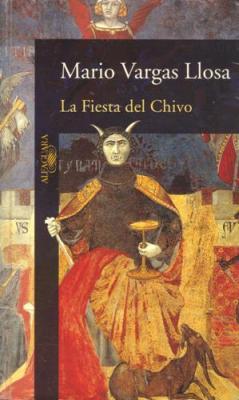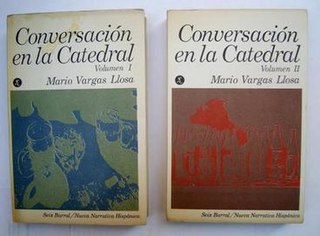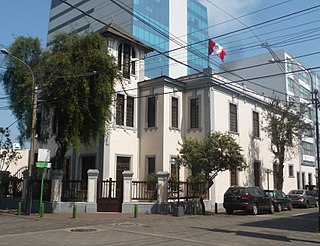
Jorge Mario Pedro Vargas Llosa, 1st Marquess of Vargas Llosa, more commonly known as Mario Vargas Llosa, is a Peruvian novelist, journalist, essayist and former politician. Vargas Llosa is one of Latin America's most significant novelists and essayists and one of the leading writers of his generation. Some critics consider him to have had a larger international impact and worldwide audience than any other writer of the Latin American Boom. In 2010, he won the Nobel Prize in Literature, "for his cartography of structures of power and his trenchant images of the individual's resistance, revolt, and defeat." He also won the 1967 Rómulo Gallegos Prize, the 1986 Prince of Asturias Award, the 1994 Miguel de Cervantes Prize, the 1995 Jerusalem Prize, the 2012 Carlos Fuentes International Prize, and the 2018 Pablo Neruda Order of Artistic and Cultural Merit. In 2021, he was elected to the Académie française.
Peruvian culture is the gradual blending of Amerindian cultures with European and African ethnic groups. The ethnic diversity and rugged geography of Peru allowed diverse traditions and customs to co-exist. Peruvian culture has been deeply influenced by Native culture, Spanish culture, and African culture. Other minor influences on their culture are Chinese, Japanese, and other European peoples.

The Feast of the Goat is a 2000 novel by the Peruvian Nobel Prize in Literature laureate Mario Vargas Llosa. The book is set in the Dominican Republic and portrays the assassination of Dominican dictator Rafael Trujillo, and its aftermath, from two distinct standpoints a generation apart: during and immediately after the assassination itself, in May 1961; and thirty-five years later, in 1996. Throughout, there is also extensive reflection on the heyday of the dictatorship, in the 1950s, and its significance for the island and its inhabitants.

The National University of San Marcos is a public research university located in Lima, the capital of Peru. At the continental level, it is the first officially established and the oldest continuously operating university in the Americas, which is why it appears in official documents and publications as "University of Peru, Dean University of the Americas".

Julio Ramón Ribeyro Zúñiga was a Peruvian writer best known for his short stories. He was also successful in other genres: novel, essay, theater, diary and aphorism. In the year of his death, he was awarded the US$100,000 Premio Juan Rulfo de literatura latinoamericana y del Caribe. His work has been translated into numerous languages, including English.
Álvaro Vargas Llosa is a Peruvian-Spanish writer and political commentator and public speaker on international affairs. He is also the writer and presenter of a documentary series for National Geographic Channel on contemporary Latin American history that is being shown around the world. He leads the business advisory committee of the Fundación International para la Libertad (FIL). He was very involved in the struggle for the return of democracy in Peru at the end of the 1990s and the years 2000–2001.

The Time of the Hero is a 1963 novel by Peruvian writer and Nobel laureate Mario Vargas Llosa. It was Vargas Llosa's first novel and is set among the cadets at the Leoncio Prado Military Academy in Lima, which he attended as a teenager. The novel portrays the school so scathingly that its leadership burned many copies and condemned the book as Ecuadorian propaganda against Peru.

The Green House is the second novel by the Peruvian writer Mario Vargas Llosa, published in 1966. The novel is set over a period of forty years in two regions of Peru: Piura, a dusty town near the coast in the north, and Peruvian Amazonia, specifically the jungle region near the Marañón river.
Isaac Humala Núñez is a Peruvian labour lawyer and the ideological leader of the Movimiento Etnocacerista, a group of ethnic nationalists in Peru.

Latin American literature consists of the oral and written literature of Latin America in several languages, particularly in Spanish, Portuguese, and the indigenous languages of the Americas. It rose to particular prominence globally during the second half of the 20th century, largely due to the international success of the style known as magical realism. As such, the region's literature is often associated solely with this style, with the 20th century literary movement known as Latin American Boom, and with its most famous exponent, Gabriel García Márquez. Latin American literature has a rich and complex tradition of literary production that dates back many centuries.

The Way to Paradise is a novel published by Mario Vargas Llosa in 2003.

Conversation in The Cathedral is a 1969 novel by Spanish-Peruvian writer and essayist Mario Vargas Llosa, translated by Gregory Rabassa. One of Vargas Llosa's major works, it is a portrayal of Peru under the dictatorship of Manuel A. Odría in the 1950s, and deals with the lives of characters from different social strata. The ambitious narrative is built around the stories of Santiago Zavala and Ambrosio respectively; one the son of a minister, the other the minister's chauffeur. A random meeting at a dog pound leads to a riveting conversation between the two at a nearby bar known as The Cathedral. During the encounter Zavala tries to find the truth about his father's role in the murder of a notorious Peruvian underworld figure, shedding light on the workings of a dictatorship along the way.

The Storyteller is a novel by Peruvian author and Literature Nobel Prize winner Mario Vargas Llosa. The story tells of Saúl Zuratas, a university student who leaves civilization and becomes a "storyteller" for the Machiguenga Native Americans. The novel thematizes the Westernization of indigenous peoples through missions and through anthropological studies, and questions the perceived notion that indigenous cultures are set in stone.

The Dream of the Celt is a novel written by Peruvian writer and 2010 Nobel laureate in literature Mario Vargas Llosa.

Every Blood is the fifth novel of the Peruvian writer José María Arguedas published in 1964. It is the author's longest and most ambitious novel, being an attempt to portray the whole of Peruvian life, by means of representations of geographic and social scenes of the entire country, although its focus is on the Andean sierra. The title alludes to the racial, regional and cultural diversity of the Peruvian nation. The novel revolves around two fundamental ideas: the danger of imperialist penetration into the country through large transnational companies, and the problem of modernization of the indigenous world.

Deep Rivers is the third novel by Peruvian writer José María Arguedas. It was published by Losada in Buenos Aires in 1958, received the Peruvian National Culture Award in 1959, and was a finalist in the William Faulkner Foundation Ibo-American award (1963). Since then, critical interest in the work of Arguedas has grown, and the book has been translated into several languages.
Julia Urquidi Illanes was a Bolivian writer and the basis for the fictional character Aunt Julia in the novel Aunt Julia and the Scriptwriter by Mario Vargas Llosa.

The Raúl Porras Barrenechea Institute of the National University of San Marcos (IRPB-UNMSM) was founded in 1964 by the University of San Marcos in honor of the distinguished alum, Peruvian historian and diplomat Raúl Porras Barrenechea. The institute acts as a Center for Higher Studies and Peruvian Research, developing and promoting research mainly related to the areas of humanities, arts and social sciences. To this end, the institute offers researchers and the general public a library specialized in the mentioned fields.

The Fragrance of Guava is a book based on the long conversations between Gabriel García Márquez and his close friend Plinio Apuleyo Mendoza. Published in 1982, the book describes the life of García Márquez, from his early childhood to his encounters with celebrities. The title of the book in Spanish is El Olor de la Guayaba. It was translated as The Fragrance of Guava.

The 2010 Nobel Prize in Literature was awarded the Peruvian writer Mario Vargas Llosa "for his cartography of structures of power and his trenchant images of the individual's resistance, revolt, and defeat." The prize was announced by the Swedish Academy on 7 October 2010. He is the first Nobel laureate in Literature from Peru and the fifth Latin American to become one after 1982 Colombian laureate Gabriel García Márquez and 1971 Chilean laureate Pablo Neruda.















